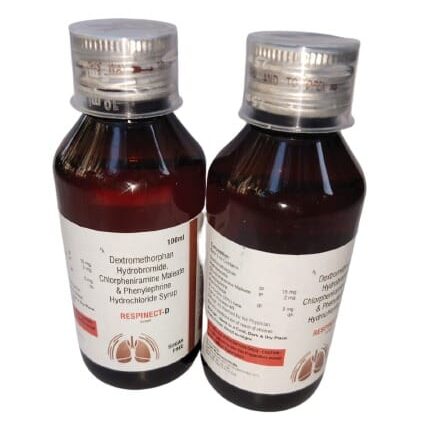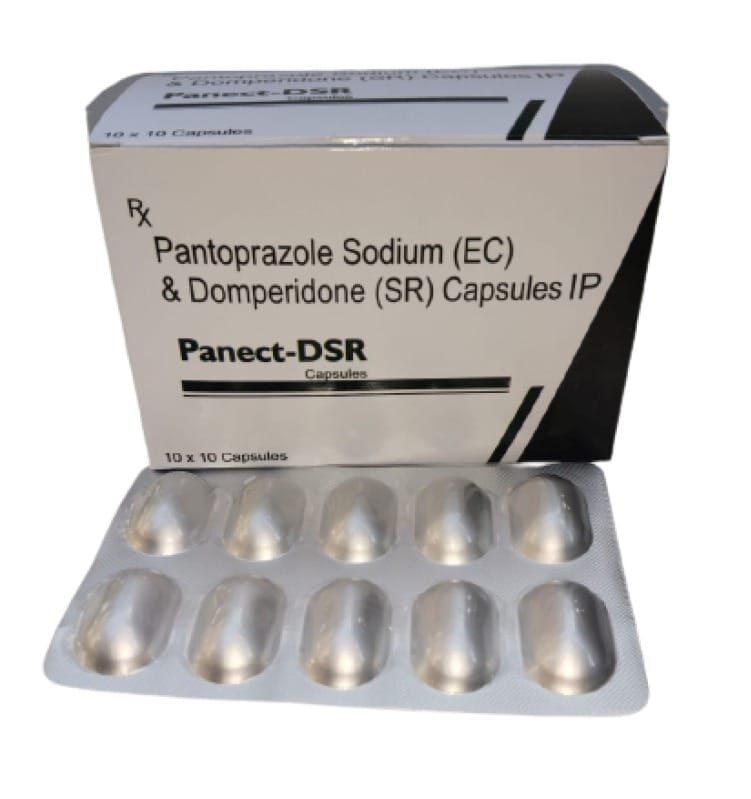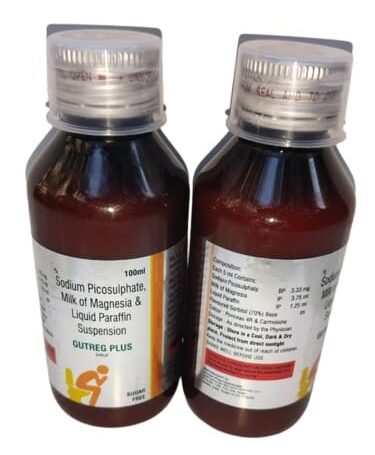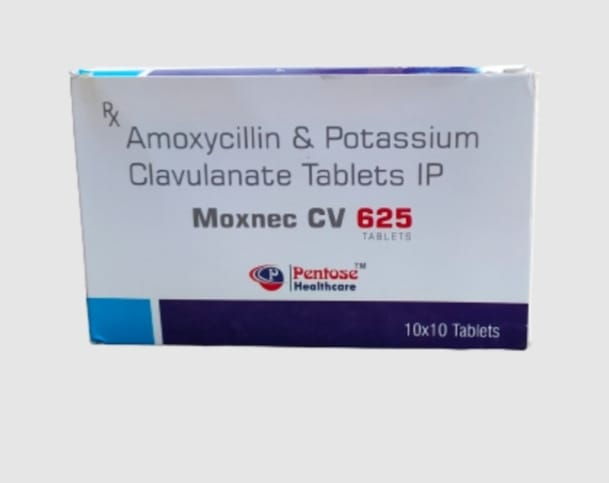Description
Respinect D belongs to a class of medication called ‘cough and cold preparations’ primarily used to treat dry cough. Coughing (dry or productive) is the body’s way of clearing irritants (like allergens, mucus, or smoke) from airways and preventing infection. There are two types of coughs, namely: dry cough and chesty cough. A dry cough is tickly and doesn’t produce any vicious or thick mucus, while a chesty cough (wet cough) means mucous or sputum is produced to help clear the airways.
Respinect D is a combination of three drugs, namely: Chlorpheniramine maleate (antihistamine), Phenylephrine hydrochloride (decongestant), and Dextromethorphan hydrobromide (cough suppressant). Chlorpheniramine maleate works by blocking the action of histamine, a substance responsible for causing allergic reactions. Phenylephrine hydrochloride helps in shrinking the blood vessels located in the nasal passage, thereby reducing the stuffy nose. Dextromethorphan hydrobromide works by blocking the transmission of nerve signals from the cough center in the brain to the muscles that produce cough. Together, it helps to provide relief from dry cough.
Take Respinect D as prescribed. Your doctor will recommend how often you need to take Respinect D based on your medical condition. Some people may experience dry mouth, throat, or nose, drowsiness, blurred vision, constipation, dizziness, restlessness, or excitation. Most of these side effects of Respinect D do not require medical attention and gradually resolve over time. However, if the side effects persist or worsen, please consult your doctor.
If you are pregnant or breastfeeding, it is advised to inform your doctor before using Respinect D. If you are about to undergo any medical tests or surgery, please inform your doctor that you are taking Respinect D. Avoid using Respinect D if you have taken monoamine oxidase inhibitors in the past 14 days. If you have glaucoma, urinary problems, enlarged prostate, phenylketonuria (a congenital disability that causes accumulation of amino acid, phenylalanine in the body), cough with mucus or cough caused by asthma, smoking, chronic bronchitis or emphysema (a lung condition causing shortness of breath), inform your doctor before taking Respinect D.
Uses of Respinect D
Dry cough
Medicinal Benefits
Respinect D is a combination of three drugs, namely: Chlorpheniramine maleate, Phenylephrine hydrochloride, and Dextromethorphan hydrobromide. Respinect D is a combination medicine belonging to a class of drugs called ‘cough and cold preparations’ primarily used to treat dry cough. Chlorpheniramine maleate works by blocking the action of histamine, a substance responsible for causing allergic reactions. It helps provide relief from allergy symptoms such as sneezing, running nose, watery eyes, itching, swelling, congestion or stiffness. Phenylephrine hydrochloride is a decongestant that helps in shrinking the blood vessels located in the nasal passage, thereby reducing the stuffy nose. Dextromethorphan hydrobromide works by blocking the transmission of nerve signals from the cough centre in the brain to the muscles that produce cough. Thus, Respinect D helps to relieve cough, cold and allergic symptoms.
Directions for Use
Syrup: Check the label for directions before using it. Shake the bottle well before use. Take Respinect D as prescribed by your doctor with the help of a measuring cup provided with the pack.Capsule/Tablet: Swallow it with a glass of water. Do not break, crush or chew it.
Storage
Store in a cool and dry place away from sunlight
Warning and Precautions
Drug Warnings
If you are allergic to Respinect D or any other medicines, please tell your doctor. If you are pregnant or breastfeeding, it is advised to inform your doctor before using Respinect D. Respinect D is not recommended for children below 12 years of age. If you are about to undergo any medical tests or surgery, please inform your doctor that you are taking Respinect D. Avoid taking Respinect D if you have taken medicines such as linezolid, phenelzine, selegiline, rasagiline, isocarboxazid, tranylcypromine and methylene blue injection in the past 14 days. If you have glaucoma, urinary problems, enlarged prostate, phenylketonuria (a birth defect that causes accumulation of amino acid, phenylalanine in the body), cough with mucus or cough caused by asthma, smoking, chronic bronchitis or emphysema (a lung condition causing shortness of breath), inform your doctor before taking Respinect D.
Drug Interactions
Drug-Drug Interaction: Respinect D may have interaction with anti-allergic drugs (diphenhydramine), anti-psychotic (escitalopram, desvenlafaxine, vilazodone), pain killer (aspirin), cold medicines (acetaminophen), antibiotics (amoxicillin), anti-depressants (linezolid, phenelzine, selegiline, rasagiline, isocarboxazid, tranylcypromine), beta-blockers (metoprolol, atenolol), muscle relaxants (carisoprodol, cyclobenzaprine).
Drug-Food Interaction: Respinect D may interact with alcohol. Therefore, avoid alcohol consumption with Respinect D as it may increase the risk of adverse effects such as drowsiness, dizziness or difficulty in concentrating.
Drug-Disease Interaction: Respinect D may have interactions with disease conditions such as liver or kidney disease, asthma, diabetes, glaucoma, cardiovascular diseases, enlarged prostate, chronic bronchitis or emphysema (a lung condition causing shortness of breath).
- Avoid consumption of alcohol with Respinect D as it may increase drowsiness. Please consult a doctor before consuming alcohol with Respinect D.
- The safety of Respinect D in pregnant women is unknown. Consult your doctor if you have any concerns; your doctor will prescribe only if the benefits outweigh the risks.
- It is unknown whether Respinect D is excreted in human milk. Consult your doctor if you have any concerns; your doctor will decide if Respinect D can be taken by breastfeeding mothers or not.
- Respinect D may cause dizziness or drowsiness in some people. Therefore, drive only if you are alert after taking Respinect D.
- Take Respinect D with caution, especially if you have a history of liver disease. The dose may be adjusted by your doctor as required.
- Take Respinect D with caution, especially if you have a history of kidney disease. The dose may be adjusted by your doctor as required.
- Respinect D is not recommended for children below 12 years of age. However, please consult a doctor before using Respinect D in children.
FAQ
How does Respinect D work?
Respinect D contains Chlorpheniramine maleate, Phenylephrine hydrochloride, and Dextromethorphan hydrobromide. Chlorpheniramine maleate works by blocking the action of histamine, a substance responsible for causing allergic reactions. Phenylephrine hydrochloride helps in shrinking the blood vessels located in the nasal passage, thereby reducing the stuffy nose. Dextromethorphan hydrobromide works by blocking the transmission of nerve signals from the cough centre in the brain to the muscles that produce cough.
Can I take Respinect D if I need to undergo surgery?
Consult your doctor before taking Respinect D if you need to undergo surgery as it may lead to excessive drowsiness and sleepiness when given along with anaesthesia. Your doctor may advise you to stop taking Respinect D 72 hours prior to the surgery.
Can I take Respinect D with anti-depressant medicines?
It is not recommended to take Respinect D along with any anti-depressant medication, especially MAO inhibitors (linezolid, phenelzine, selegiline, rasagiline, isocarboxazid, tranylcypromine), as it may lead to unpleasant side-effects or drug interaction. Also, Respinect D should be taken at least 14days after your last dose of anti-depressants.
What happens if I miss a dose?
Take the missed dose as soon as you remember. However, if it is almost time for your next dose, wait until then to take Respinect D and skip the missed dose. Do not take extra medicine to make up for the missed dose.
Can Respinect D be used in patients with glaucoma?
Respinect D may rarely worsen the symptoms of glaucoma. Therefore, Respinect D should be used with caution and only when prescribed by a doctor in patients with glaucoma.







